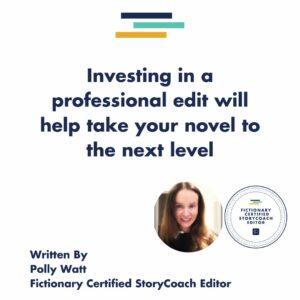
Making the decision to work with an editor can be tricky, especially if this is your first novel. You’ve completed your manuscript, self-edited it, incorporated beta-reader feedback, and don’t know what else could improve it further.
You’re excited–deservedly so, because you’ve written a novel!
A beautiful, unique creation. You’re slightly in love with your story. But an infernal voice inside your head won’t let you rest, whispering you’re not there yet.
However, since you’ve no idea what else to do, you brush it away.

Perhaps you self-publish, or you submit your manuscript to agents, and your dreams come true: high sales, gushing reviews, a new career. If so, congratulations! You deserve your success.
But perhaps your hopes aren’t realized. You wait for glowing feedback, multiple agent offers, publishing house auctions, competition prizes and impressive sales.
You wait in vain.
You re-read your manuscript. You know—deep down—it lacks something. You just don’t know what.

How to solve problems you can’t even identify?
Investing in a professional edit will help take your novel to the next level.
Perhaps you think this is a waste of money.
I’m a terrible writer, you think. I don’t want to work with an editor because my story sucks. The best editor in the world can’t turn straw into gold.
Torturing yourself like this is a fallacy.
Ha! you say. Writing comes from genius, and this is something I obviously lack. Shakespeare, Dickens, and Wordsworth all possessed brilliance I never will. They didn’t need to work with an editor.
Stop right there. These writers possessed a secret weapon, aside from their undeniable genius.
A classical education.
They’d have studied Aristotle’s Three-Act Structure, learnt rhetorical devices, and have understood story structure from a young age. Our modern education system rarely focuses on the fundamentals of storytelling and story structure, unless you study creative writing.
But, you scream, I understand that cursed structure! I’ve read all the craft books!
Perhaps you’ve taken extensive creative writing courses, but still struggle to see what your story lacks.
It’s all subjective, you sigh. The market just isn’t right for my story.

But can you really stand back, assessing your manuscript’s strengths and weaknesses from a detached standpoint?
Probably not. Your book is your baby. It’s near impossible to find all its flaws.
A professional story editor, however, can do this for you.
And don’t despair if understanding the three-act structure doesn’t give you Shakespeare’s poetic genius. That’s setting the bar too high. You don’t need to be Shakespeare to sell novels. But you might as well learn from the best.
What should you expect when you work with an editor? And what does your story editor expect from you in return?
To get the most from your investment, you’ll want to understand how best to work with your story editor.
Unless poor spelling and grammar makes your novel actually illegible, it’s more likely your story’s failure to take off is due to structural issues. You’ll want to look first at hiring a story editor, not a copy editor.
For more on the difference between a story editor and copy editor, see Shane Millar’s blog here and Kara Henderson’s blog here.
For strong writer-editor collaborations, the following attributes are key.

Respect
- You deserve to work with an editor who respects your artistic vision and will help you create the best version of the story you want to tell.
- You deserve to work with an editor who will treat you and your story with respect, kindness and encouragement, allowing you to explore new depths of your story’s potential.
- You do not, however, want to be treated in a patronising manner with ‘kid gloves’. You’re investing in learning how to improve your story and your writing. You must be prepared to hear you aren’t perfect–much as it stings. Your editor expects a willingness to learn.
Treat your editor’s suggestions with the same degree of respect and consideration with which you wish to be treated yourself.
Tip #1: To explore whether an editor is a good match for you, send them your blurb and ask for their initial thoughts before hiring them. You want them to be willing to understand your artistic vision, and to be familiar with your genre. Expect an editor to provide a fresh perspective.
Objectivity
When you work with an editor, they should posses the objectivity you lack. Their feedback should constitute actionable, specific and easily understandable advice on how to improve your story and individual scenes.
For more on the importance of editorial objectivity and actionable feedback, see another of my blogs here.
You need feedback about both your story’s strengths and weaknesses—suggestions on maximising the former, and overcoming the latter.
Tip #2: To ensure your editor’s style is objective and actionable, consider requesting a sample edit before hiring them–perhaps from your first 10-15 pages. For a substantial investment, it’s a reasonable request. If the editor gives a detailed scene edit of your first scene, it’s also reasonable for them to request a small, pre-agreed fee for this work.
Tip #3: If you receive feedback from your editor which you feel is subjective or not actionable, request elaboration or examples. Ask why they had that reaction, and how they suggest you address this within your own artistic vision. A polite challenge, or an admission that you don’t understand a technical term, can increase your own learning and the collaborative power of the editor-writer relationship.
For example, your editor might say: your world-building needs to be more immersive. In this case, request further explanation.
You could ask:
- Which scenes felt most and least immersive?
- Would greater use of senses help?
- Would more backstory help, and if so, where?
If you’re writing in a genre which encourages minimal world building (such as an urban fantasy romance, in contrast with an adult high-fantasy epic), then what is the minimum amount of world-building your story can handle?
Tip #4: If your editor doesn’t volunteer this information, or fails to give you satisfactory answers, consider whether they’re the best editor for you.
Thoroughness
When you work with an editor of story, they should provide thorough, comprehensive feedback on overall:
- Story structure
- Scene goals/story goals/character goals
- Pacing
- Plot
- Character development
- Setting
Extensive revision and rewriting will likely be recommended. Try not to take offence.
Don’t expect your story editor to create multiple track changes, correct your prose, or do the rewriting for you.
Your editor will expect you to be open to making substantial changes and to treating their suggestions with detailed consideration and respect. Consider feedback carefully—over time—before rejecting it.
Expect your editor to advise you on aspects of your writing and story craft which could benefit from further study. In return, your editor expects you to respect their time.
You’re not paying them to teach you creative writing and self-study may be required.
Tip #5: If your editor refers to unfamiliar technical terms, request suggestions for further study. Perhaps you’re weak on point of view, scene structure, indirect free style, sequel scenes etc. An editor should be willing to point you in the right direction.
To conclude
Finding the right story editor can transform your novel, increasing your prospects of publishing success.
If you’re waiting to work with an editor who’s perfect for you, don’t forget: all Fictionary StoryCoach Certified Editors have been trained—and assessed upon their ability—to provide respectful, objective, and comprehensive story edits.
You can find a list of Fictionary StoryCoach Certified Editors (including me) here.
Article Written by Polly Watt

A former refugee lawyer in the UK, Polly Watt honed her skills working on cases where careful editing often really was a matter of life and death.
As a Fictionary StoryCoach Editor, she will apply the same care and attention to detail to your structural story edit. She’s passionate about stories and loves working on all different types of literary genres.
Want to tell stories guaranteed to delight readers?
Sign-up for you 14 day free trial of StoryTeller today!




